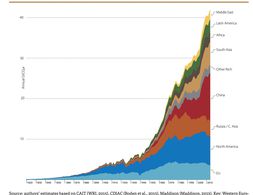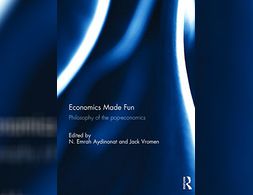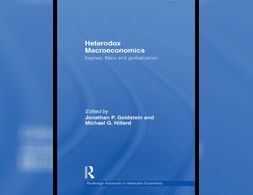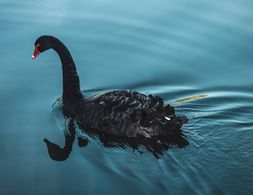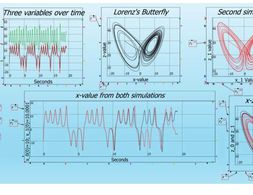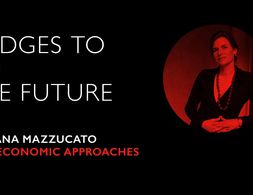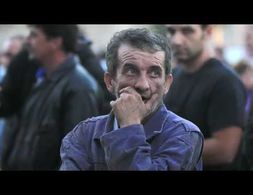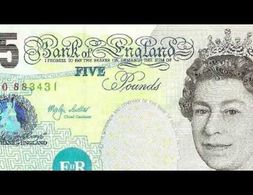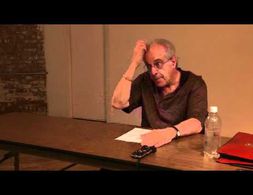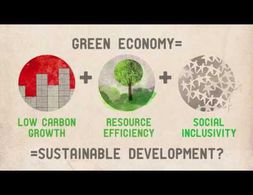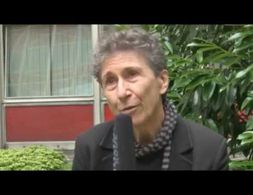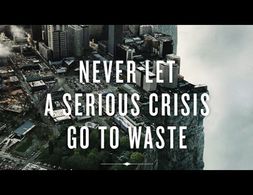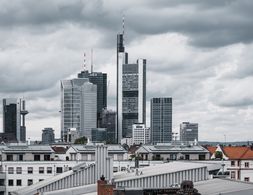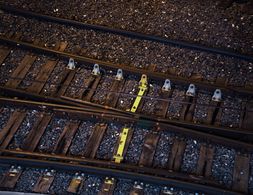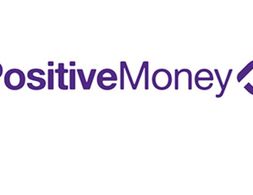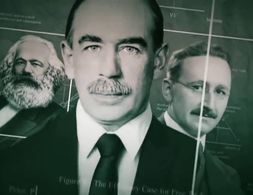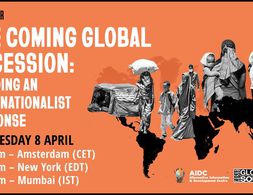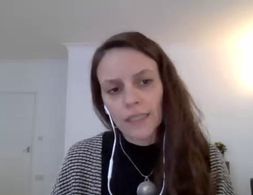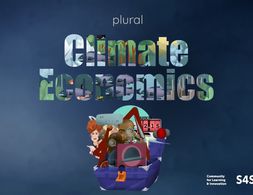545 Ergebnisse
The British historian, Adam Tooze, highlights how the climate crisis is not just an environmental or ecological problem but also a political economy challenge.
This film looks at the role economic growth has had in bringing about this crisis, and explores alternatives to it, offering a vision of hope for the future and a better life for all within planetary boundaries.
In Trouble in Paradise, Slavoj Žižek, one of our most famous, most combative philosophers, explains how by drawing on the ideas of communism, we can find a way out of the crisis of capitalism.
Best-selling books such as Freakonomics and The Undercover Economist have paved the way for the flourishing economics-made-fun genre. While books like these present economics as a strong and explanatory science, the ongoing economic crisis has exposed the shortcomings of economics to the general public.
Heterodox Macroeconomics offers a detailed understanding of the foundations of the recent global financial crisis.
The 2007–08 credit crisis and the long recession that followed brutally exposed the economic and social costs of financialization. Understanding what lay behind these events, the rise of “fictitious capital” and its opaque logic, is crucial to grasping the social and political conditions under which we live. Yet, for most people, the operations of the financial system remain shrouded in mystery.
In the late nineteenth and early twentieth centuries, Bombay was beset by crises such as famine and plague. Yet, rather than halting the flow of capital, these crises served to secure it. In colonial Bombay, capitalists and governors, Indian and British alike, used moments of crisis to justify interventions that delimited the city as a distinct object and progressively excluded laborers and migrants from it.
In this searing and insightful critique, Adrienne Buller examines the fatal biases that have shaped the response of our governing institutions to climate and environmental breakdown, and asks: are the 'solutions' being proposed really solutions? Tracing the intricate connections between financial power, economic injustice and ecological crisis, she exposes the myopic economism and market-centric thinking presently undermining a future where all life can flourish.
Mit dem seit Ende März allseits konstatierten Beginn einer Wirtschaftskrise stellen sich vorrangig zwei Fragen: Inwieweit ist die Corona-Pandemie der Ausgangspunkt (oder gar die Ursache) dieser Krise? Und zweitens: Kann mit den beschlossenen Hilfsprogrammen eine tiefgreifende, langanhaltende Rezession verhindert werden?
Steve Keen provides an alternative view on Macroeconomics before and after the crisis and outlines different macroeconomic fallacies.
In this interview Mariana Mazzucato talks about economic actions governments need to take facing the Corona-crisis. Using the example of Britain, she argues that governmental bailouts need to be bound to commitment to sustainability.
This workshop offers an introduction to Degrowth and Ecological Economics. It starts by surveying the socio-ecological crisis and its pseudo-solutions, and then moves to Ecological Macroeconomics as a relatively recent field of scholarship within Ecological Economics.
Renowned scholars elaborate a critique on neoclassical economics and how it was unable to predict and even favoured the financial crisis. They refer to DSGE models, equilibrium theory and rational agents – a brief insight in the critique on neoclassic economics.
How was money actually invented? Where does it come from? In this first episode of a video lecture, Dirk Bezemer from the University of Groningen presents the origins of money and how it's related to debt. It's a basic historical review and you can get an idea of how money is created and how banks work. The following episodes aim at giving an overview of the last debt crisis.
Economist and 2020 Balzan Prize winner for Environmental Challenges: Responses from the Social Sciences and Humanities, Joan Martínez Alier, speaks on the importance of ecological economics and its timeliness around the 2007/2008 global financial crisis. He speaks on the importance of building the field of ecological economics “from the ground up” through praxis.
Capitalism cannot fulfil the promises of the French revolution: Liberty, Equality, Fraternity. Why? Richard Wollf elaborates on Marx's analysis of the distribution and organisation of surplus in society and his conclusion that there is something inherently wrong in capitalist class structure that still causes economic crisis in our modern times. Change requires changing the organisation of the production. This goes far beyond a discussion of 'more-state' vs. 'less-state'.
What is sustainable development and what is the idea of a green economy? What is the role of the green economy in the current triple crisis? The short video discusses the concept and in particular the concerns about a green economy, especially with regards to inequality and poverty. The short statements in the video also reflect other possibilities of transformation.
Silvia Federici illustrates the potential of the concept of the commons as way of resistance and reorganization of the society in times of social injustice and ecological crisis. Amongst others, she outlines the role of women in the commons movement.
Federici explains why she regards the theory of the tragedy of the commons as unfounded and why she considers Marx's concept of primitive accumulation as still appropriate to describe current events of deprivation, such as land grabbing.
In this lecture Ben Fine aims at stimulating interest for and explaining the relevance of Marxist Political Economy. Ben Fine dedicates the first half of his comprehensible lecture to the question on how mainstream economics became the way it is by explaining its key concepts and how those evolved during the past 150 years. While critically reflecting those concept he also emphasizes that mainstream economics does not consider historical processes. This is the point of departure on his presentation of the core terms and crucial categories of Marxist Political Economy: e.g. the production process and class relations (Part 1). Part 2 examines the consequences of the capitalist mode of production and its propensity to crises. Ben Fine illustrates this Marxist analysis with the example of the current crisis and explains current conditions for the accumulation of capital.
In this lecture Ben Fine aims at stimulating interest for and explaining the relevance of Marxist Political Economy. Ben Fine dedicates the first half of his comprehensible lecture to the question on how mainstream economics became the way it is by explaining its key concepts and how those evolved during the past 150 years. While critically reflecting those concept he also emphasizes that mainstream economics does not consider historical processes. This is the point of departure on his presentation of the core terms and crucial categories of Marxist Political Economy: e.g. the production process and class relations (Part 1). Part 2 examines the consequences of the capitalist mode of production and its propensity to crises. Ben Fine illustrates this Marxist analysis with the example of the current crisis and explains current conditions for the accumulation of capital.
In this radio interview, Philip Mirowski, author of the book "Never Let a Serious Crisis Go to Waste" presents several differences between neoclassical economics and neoliberalism. Apart from a historical outline, Mirowski primarily discusses different perceptions of markets and the role of the state. Mirowski further reflects on the role think tanks ("part of the "neoliberal thought collective") and the entrepreneurial self (the "neoliberal agent") in the spreading and fostering of the neoliberalism.
This multimedia dossier is part of the series „Understanding Finance“ by Finance Watch and explores the following questions: What is bank capital and how is it regulated? It further presents controversies on the size of bank capital in the aftermath of the financial crisis and on how bank capital affects economic activity.
This multimedia dossier is part of the series „Understanding Finance“ by Finance Watch. The dossier focuses on universal banks – banks that pursue commercial and investment banking and points out several problems of those megabanks, especially in the context of the financial crisis (too big to fail).
The page "Positive Money" gathers text and short videos which explain how money is created by banks by giving loans. It furthermore presents the consequences of this process on housing prices, inequality and the environment and its role in the financial crisis. The dossier is provided by the campaign "Positive Money" which aims at a democratic control over money creation. Besides texts by the campaign, the page makes available links to journal and conference articles on the topic. The page focuses on the banking system of the UK.
Irene van Staveren, professor of pluralist development economics, presents her pluralist teaching method for the introductory level. Based on her textbook “Economics After the Crisis: An Introduction to Economics from a Pluralist and Global Perspective” she suggests to focus on real-world problems and pari passu apply economic theories such as Social economics, Institutional economics, Post-Keynesian economics as well as Neoclassical economics without wasting time to single out the latter. Besides pointing out advantages of such a pluralist method Irene illustrates her approach based on interesting topics such as growth or feminist economics.
In this radio program, the anthropologist David Graeber, explores the history of debt in (currently) 12 episodes. The program is based on his book Debt: The First 5000 Years. First, Graeber asks the questions of how debt and money are characterized, which meaning and roles they had in different historic episodes and how they were interrelated. In the most recent episodes, Graeber elaborates on how debt shaped society. He argues that debt had a different moral status in different times of history, one session analyses the current financial and economic crisis and the role of credit in this historical context.
This historic timeline presents economic events, economic thinkers and schools of thought from the 18th century until the 2007/2008 financial and economic crisis with short texts on the respective event or perspective.
During his life, Keynes was credited with, amongst other things, with helping to save capitalism from the Great Depression, funding the war against the Nazis and building post-war decades of growth and rising prosperity. And when the global crisis struck in 2008, it was his ideas that the world's leaders turned to help avoid another depression.
The likely global impacts of the economic fallout from the Coronavirus and how we might be better prepared than the 2008 economic crisis to put forward progressive solutions.
Jens Beckert and Richard Bronk, authors of "Uncertain Times", explore the extent to which flaws, blind spots and more importantly bias created by macroeconomics models, based on forecasts and statistical devices, shape crisis and the market economy in which we live.
Understanding gender inequality is possible only when looking at the intersections between race and class inequalities. The health crisis is no different: Stevano takes a feminist and social reproductive perspective, from unpaid household work to social infrastructure and services.
Can pluralism in economics be useful to tackle the fight against climate change? How can a diversity in methods and ideas allow for a better understanding of the issue of the climate crisis? What solutions do different schools of thought offer to overcome the most pressing challenge of the 21st Century? Our Rethinker Henrika Meyer will give you some answers and give you a glimpse of the solutions pluralism offers to tackle the fight against climate change.
Wir nutzen Cookies. Klicke auf "Akzeptieren" um uns dabei zu helfen, Exploring Economics immer besser zu machen!

